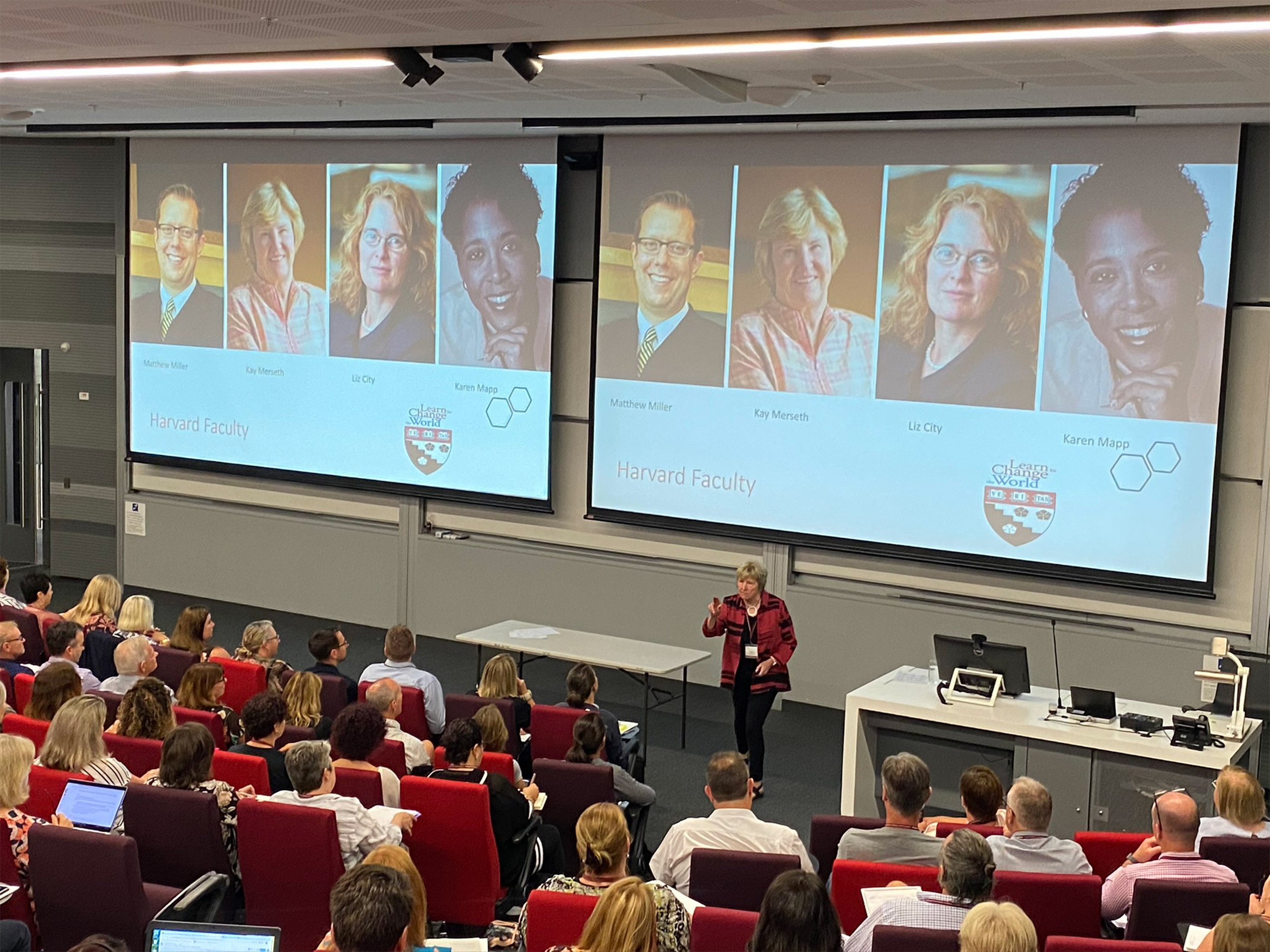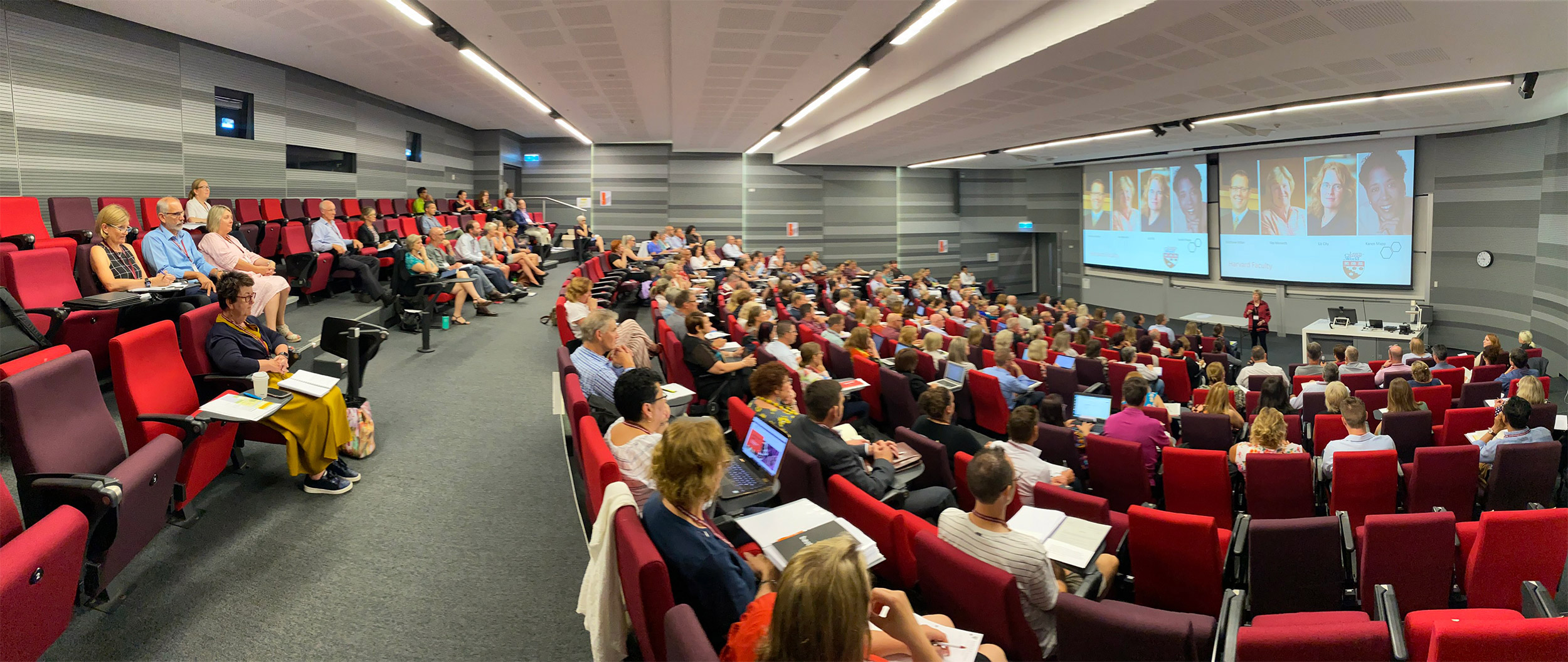
Harvard Graduate School of Education’s Leadership for School Excellence program for principals was held at the University of Sydney Business School in Australia with more than 170 education leaders in attendance.
Photos courtesy of Professional Education at Harvard Graduate School of Education
Working with principals in fire-scarred Australia
Graduate School of Education joins with regional Harvard Club to bring more participants from more diverse areas to leadership program
As deadly bush fires ravaged swaths of Australia, some schools were transformed into temporary sites for refuge while others were damaged or destroyed. It was the most recent example of how, throughout the country and especially in remote, rural areas, schools have played and continue to play roles in the community far beyond the education and training they provide
That wider mission has been underscored in recent months, and it informed many of the sessions of the Harvard Graduate School of Education’s (HGSE) Leadership for School Excellence program for principals. The program, held at the University of Sydney Business School from Jan. 13–16, drew more than 170 education leaders from across the country and New Zealand, and marked the first time the training, which is tailored to regional challenges and concerns, has been offered outside the U.S. It marked the largest and most geographically diverse group ever served by the program.
“The professionalism was over the top,” said Katherine Merseth, senior lecturer on education, director of the Teacher Education Program at Harvard Graduate School, and faculty chair of the program. The participating principals were “earnest, eager, and engaged,” including those whose schools were in the fire zone, she said. “The fires are a terrible tragedy for the country, but schools must go on, and children must learn, and [the principals] all came wanting to learn.”
Toni Burford, principal of Lobethal Primary School, said the fires have meant “our students, their families and our local businesses have needed support to access services, counselors, childcare, financial help, and pastoral care.” She said the response to their needs has shown “how the role as principal has evolved to include a much greater emphasis on knowing your community and your team well, and developing strong strategies to support people’s well-being.” Burford said she has heard from colleagues who have been involved in “volunteering time at relief centers … [and] phoning families and staff members affected by the loss of their homes, animals, and property,” for example.
“… the role as principal has evolved to include a much greater emphasis on knowing your community and your team well, and developing strong strategies to support people’s well-being.”
Toni Burford, principal of Lobethal Primary School
The program was run by HGSE’s Principals’ Center — a part of its Professional Education division — in partnership with the Harvard Club of Australia’s education scholarship program. Though principals from Australia have been making the journey to Cambridge for the past seven years to take part in a similar program supported by the club, this year Harvard faculty traveled to Australia for the first time. This made the program more accessible to more principals and to a wider diversity of schools in Australia, a goal important to both the Principal Center faculty and HCA.
“Principals are key leaders in their communities,” said Chris Smith, HCA vice president. He noted that the bush fires began during the summer break for schools, which typically runs for about six weeks starting sometime shortly before Christmas, depending on the state. “Many of the 171 principals [who participated in the program] will return to a new school year facing with disrupted families and distracted children. We hope we have helped them with tools and peer support to address the significant challenges they face.”
For club members, their success bringing a few principals from Australia to Harvard in recent years made them want to do even more, said Smith. It was important to find a way to bring the program to a greater number of school leaders, especially from under-resourced, regional, and remote communities, he explained.
“[We were] inspired to make a bigger difference, and we had the idea, what would happen if we brought the course to Australia, and not just three to four principals would get the opportunity to access this amazing learning, but maybe 200 principals a year?” said club member Ricky Campbell-Allen, Ed.M. ’10, in a video the club created to encourage principals to apply. “What kind of impact could we have with that?” Campbell-Allen, a Menzies Scholar while at HGSE, is the director of EdCapital, an education consultancy.
Their efforts paid off. Their support made it possible for almost 50 principals from across the continent to attend.
Catherine Gardner, director of the Principals’ Center, a suite of learning programs in HGSE’s Professional Education unit, said the Harvard Club of Australia’s targeted efforts to financially support leaders in regional and remote areas yielded noteworthy and welcome change. “One thing that was truly unique about the program and what so many of the participants spoke about was how diverse the cohort was,” she said. “We had leaders from every state and territory, plus New Zealand, and served just as many regional and remote leaders as metropolitan. Australia is a big country; some of the leaders in remote areas shared they have to fly to connect with other school leaders. Across the board they shared how valuable it was to have so many leaders from different parts of the country and in different school contexts.”
Merseth agreed, saying that the group’s diversity of experience created “a tremendous cross-fertilization” of ideas.
Gardner added that the program would not have been possible “without the local partners who helped us understand the landscape and needs of local leaders.” With their assistance, she said, “We focused on the areas where we could add unique value as opposed to replicating what they might already receive in their own professional development.” This included creating a full case study based on an Australian principal and pulling in content and examples from local communities.
Principals and professors focused on the challenges individual leaders have faced, how they have adapted, and what they have learned. In fact, before they even arrived, principals were asked to identify a “problem of practice” that they hoped to address during the week, Merseth said. Issues could run the gamut, from encouraging faculty collaboration to improving student performance, including on standardized tests.

The faculty then offered a curriculum designed to help participants resolve these issues — new ways to frame their challenges, new insights for working in classrooms and supporting teacher performance, and new perspectives on engaging with communities and families. On the last day, each principal took part in a “consultancy with their peers to discuss the problem as it has evolved throughout the week,” Merseth said. Each leader departed the session with concrete, specific ideas, strategies, and potential solutions to take back to their schools, she said.
One of the participants, Grant Dale, has led Thuringowa State High School in Townsville, North Queensland, since 2012. Dale said his students come from predominately lower-income areas. Going into the program, he understood there was “no ‘magic wand’ to transform low socio-economic schools,” but he was “eager to reflect, learn and be inspired.”
“Already back at school, I’ve implemented some leadership strategies to enhance our meetings, our school leaders and our school focus,” he said.
Louise Wilkinson, principal at Heatley State Primary School, said the program offered “collective wisdom and collegiality … and provided greater clarity for the work I do as a principal working in a regional primary school with students who experience high levels of disadvantage.”
“The major challenge in education [in Australia] is to lift the aspiration of students and their families to reach higher levels of achievement in national and international assessments,” said the HCA’s Smith. The club hopes the program, in partnership with Australia’s Public Education Foundation and Teachers Mutual Bank, will give school leaders both “the tools and ambition to do better for their students.”





